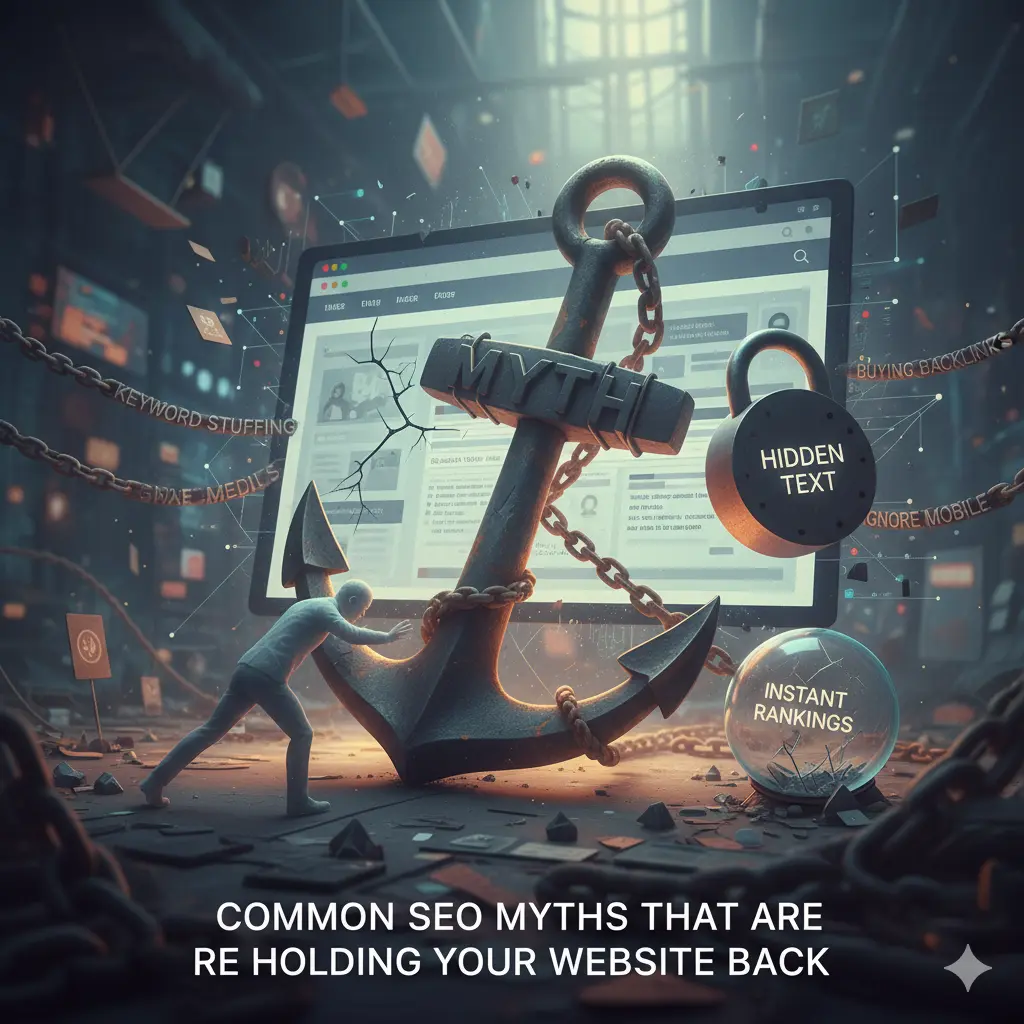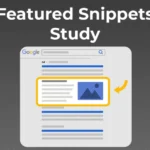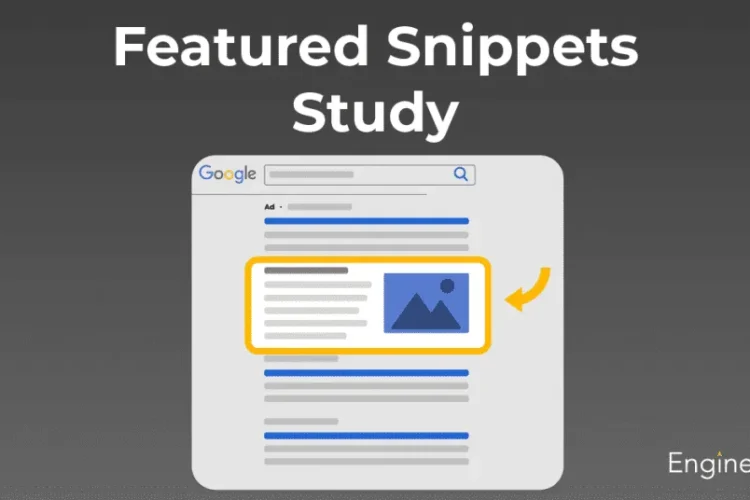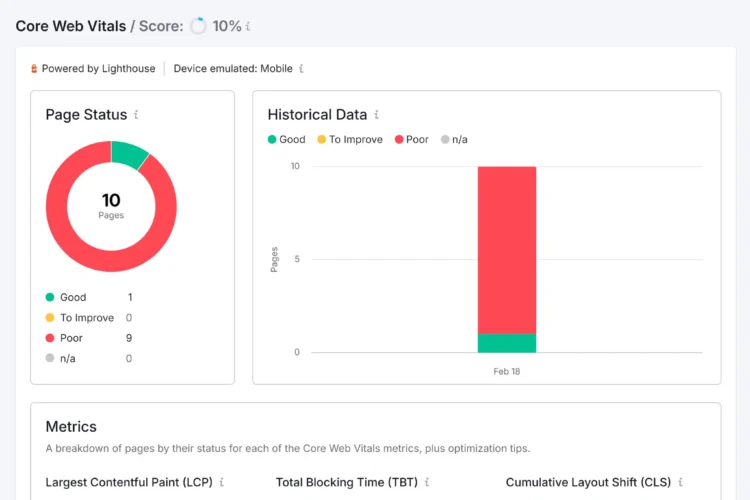
Search Engine Optimization (SEO) is one of the most powerful tools for online success — but it’s also surrounded by myths and misconceptions. Many website owners still follow outdated or false SEO practices, which can harm their rankings instead of improving them.
If you’ve ever wondered why your website isn’t ranking despite your efforts, it might be because you’re unknowingly following some of these common SEO myths. Let’s clear them up one by one!
1. SEO Is a One-Time Process
One of the biggest myths is believing that SEO is a “set it and forget it” task.
The truth: SEO is an ongoing process. Google frequently updates its algorithms, user behavior changes, and competitors continuously optimize their websites.
To stay relevant, you must regularly update your content, monitor performance, and make improvements based on new SEO trends and analytics data.
2. More Keywords Mean Better Rankings
Keyword stuffing was a popular tactic in the early 2000s — but today, it can hurt your SEO.
The truth: Google focuses on quality and context, not keyword quantity.
Overusing keywords makes your content unreadable and may lead to penalties. Instead, focus on semantic keywords, natural language, and valuable information that satisfies user intent.
3. Backlinks Are No Longer Important
Some people think backlinks don’t matter anymore. That’s false.
The truth: Backlinks remain one of Google’s top ranking factors.
However, the focus has shifted from quantity to quality. A few backlinks from trusted, high-authority websites are far more valuable than dozens from low-quality or spammy sites.
4. Longer Content Always Ranks Higher
While long-form content often performs better, word count alone doesn’t guarantee top rankings.
The truth: It’s not about length — it’s about value.
If your content answers the search query effectively, even a short, well-optimized post can outrank lengthy, irrelevant articles. Focus on quality, clarity, and completeness, not just the number of words.
5. Social Media Doesn’t Affect SEO
Many believe social media doesn’t influence rankings because Google has stated it doesn’t use social signals directly.
The truth: While likes and shares don’t directly boost rankings, social media indirectly helps SEO by increasing brand visibility, driving traffic, and generating backlinks from shared content.
So yes, a strong social presence can still enhance your SEO success.
6. Paid Ads Improve Organic Rankings
Another common myth is that investing in Google Ads can help your organic rankings.
The truth: Google Ads and organic SEO are completely separate.
Running paid campaigns can bring short-term visibility and traffic, but it doesn’t influence organic ranking. However, it can help you test keywords and gain insights for your SEO strategy.
7. SEO Results Are Instant
If someone promises you instant SEO success — run!
The truth: SEO takes time, consistency, and patience.
It can take weeks or even months to see noticeable improvements. Organic growth is gradual, but once established, it provides long-term benefits and steady traffic.
8. Duplicate Content Will Get You Penalized
While duplicate content isn’t ideal, Google doesn’t automatically penalize your site for it.
The truth: Google simply filters out duplicates to show the most relevant version.
Still, it’s best to use canonical tags and ensure your original content stands out to avoid confusion and maintain your site’s credibility.
9. You Don’t Need Technical SEO
Some people think technical SEO is optional — but it’s essential for strong website performance.
The truth: Technical SEO (like page speed, mobile responsiveness, and structured data) directly affects crawlability and user experience.
Ignoring it means Google might not even properly index your site, no matter how good your content is.
10. SEO Is All About Ranking #1
Ranking high on Google is great — but it’s not the only goal.
The truth: The ultimate aim of SEO is to drive targeted traffic and conversions, not just rankings.
Sometimes ranking for lower-volume, high-intent keywords brings better business results than competing for a #1 position on broad terms.
Conclusion
Believing in SEO myths can waste your time, money, and effort — and may even damage your website’s performance. The key to long-term success is to focus on proven strategies, stay updated with Google’s algorithm changes, and provide genuine value to your audience.
SEO is not magic — it’s a combination of strategy, patience, and continuous improvement. By letting go of these myths, you can build a stronger, smarter, and more successful online presence.
Frequently Ask Questions
1. How can I tell if I’m following outdated SEO practices?
You might be following outdated SEO tactics if you still focus on keyword stuffing, using link farms, or ignoring mobile optimization. To identify them, compare your current methods with Google’s latest guidelines and follow trusted SEO sources like Search Engine Journal or Google Search Central.
2. What are some trusted sources to learn accurate SEO information?
Reliable sources include Google Search Central Blog, Ahrefs Blog, Moz, Search Engine Journal, Neil Patel, and Backlinko. These platforms regularly share verified insights and algorithm updates straight from SEO experts.
3. Can believing in SEO myths really hurt my website performance?
Yes. Following myths like overusing keywords or ignoring mobile optimization can negatively impact your rankings, user experience, and site credibility. SEO myths waste time and effort that could otherwise be used for genuine growth strategies.
4. How often do Google’s SEO ranking factors change?
Google updates its algorithm thousands of times a year—some minor, some major. While not all updates drastically change rankings, staying informed and adaptable ensures your website continues to perform well.
5. Is it possible to recover from poor SEO practices or penalties?
Absolutely. Start by conducting an SEO audit, remove toxic backlinks, improve content quality, and submit a reconsideration request (if penalized). Consistent, white-hat SEO practices can restore and even improve your rankings over time.
6. Do all SEO strategies work the same for every type of website?
No. SEO strategies differ based on business type. For example, local SEO focuses on Google Maps and reviews, eCommerce SEO emphasizes product pages, and blog SEO centers on content depth and readability.
7. What’s the best way to stay updated with the latest SEO trends?
Follow SEO news blogs, subscribe to Google Search Central updates, join SEO communities on LinkedIn or Reddit, and regularly attend webinars or podcasts by industry experts.
8. Can hiring the wrong SEO agency harm my site rankings?
Yes. Agencies using black-hat tactics like link buying, keyword stuffing, or cloaking can cause Google penalties. Always research agencies, check case studies, and ask about their SEO methods before hiring.
9. Are there SEO myths specific to eCommerce or local businesses?
Yes. For eCommerce, a common myth is that product descriptions don’t affect SEO — they do. For local SEO, many believe Google My Business is optional, but it’s actually crucial for visibility in local searches and Maps.
10. What’s the most common SEO mistake beginners make?
Beginners often chase only high-volume keywords, ignoring long-tail and intent-based searches. This leads to stiff competition and lower conversions. Smart SEO targets both volume and relevance.
11. Does voice search optimization follow the same rules as traditional SEO?
Not entirely. Voice search focuses more on natural language and conversational queries. To optimize, use question-based keywords and concise, direct answers in your content.
12. How can I test if an SEO claim is true or just a myth?
Always cross-check claims with Google’s official resources or trusted SEO websites. Avoid believing unverified tips from random forums or videos without data-backed evidence.
13. Are free SEO tools reliable for accurate insights?
Yes, many free tools like Google Search Console, Google Analytics, and Ubersuggest provide reliable insights. However, paid tools like Ahrefs or SEMrush offer deeper data and advanced analysis.
14. Can content written by AI tools affect SEO rankings?
AI-generated content can rank well if it provides genuine value, accuracy, and originality. However, low-quality, spammy AI content can harm your SEO. Always edit and fact-check AI-written articles before publishing.
15. Do user experience (UX) and SEO go hand in hand?
Yes. Google’s ranking systems now prioritize user experience — including page speed, mobile friendliness, and ease of navigation. A great UX keeps visitors engaged, lowers bounce rates, and improves SEO performance.
✅ Pro Tip:
SEO success comes from staying informed, avoiding myths, and focusing on real value. Always prioritize your audience’s needs over outdated tactics.





